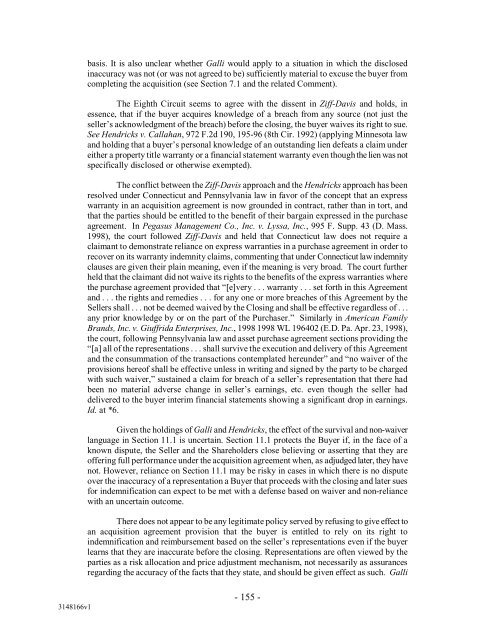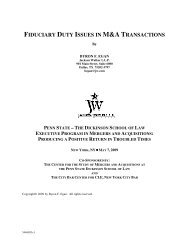asset acquisitions - Jackson Walker LLP
asset acquisitions - Jackson Walker LLP
asset acquisitions - Jackson Walker LLP
You also want an ePaper? Increase the reach of your titles
YUMPU automatically turns print PDFs into web optimized ePapers that Google loves.
asis. It is also unclear whether Galli would apply to a situation in which the disclosedinaccuracy was not (or was not agreed to be) sufficiently material to excuse the buyer fromcompleting the acquisition (see Section 7.1 and the related Comment).The Eighth Circuit seems to agree with the dissent in Ziff-Davis and holds, inessence, that if the buyer acquires knowledge of a breach from any source (not just theseller’s acknowledgment of the breach) before the closing, the buyer waives its right to sue.See Hendricks v. Callahan, 972 F.2d 190, 195-96 (8th Cir. 1992) (applying Minnesota lawand holding that a buyer’s personal knowledge of an outstanding lien defeats a claim undereither a property title warranty or a financial statement warranty even though the lien was notspecifically disclosed or otherwise exempted).The conflict between the Ziff-Davis approach and the Hendricks approach has beenresolved under Connecticut and Pennsylvania law in favor of the concept that an expresswarranty in an acquisition agreement is now grounded in contract, rather than in tort, andthat the parties should be entitled to the benefit of their bargain expressed in the purchaseagreement. In Pegasus Management Co., Inc. v. Lyssa, Inc., 995 F. Supp. 43 (D. Mass.1998), the court followed Ziff-Davis and held that Connecticut law does not require aclaimant to demonstrate reliance on express warranties in a purchase agreement in order torecover on its warranty indemnity claims, commenting that under Connecticut law indemnityclauses are given their plain meaning, even if the meaning is very broad. The court furtherheld that the claimant did not waive its rights to the benefits of the express warranties wherethe purchase agreement provided that “[e]very . . . warranty . . . set forth in this Agreementand . . . the rights and remedies . . . for any one or more breaches of this Agreement by theSellers shall . . . not be deemed waived by the Closing and shall be effective regardless of . . .any prior knowledge by or on the part of the Purchaser.” Similarly in American FamilyBrands, Inc. v. Giuffrida Enterprises, Inc., 1998 1998 WL 196402 (E.D. Pa. Apr. 23, 1998),the court, following Pennsylvania law and <strong>asset</strong> purchase agreement sections providing the“[a] all of the representations . . . shall survive the execution and delivery of this Agreementand the consummation of the transactions contemplated hereunder” and “no waiver of theprovisions hereof shall be effective unless in writing and signed by the party to be chargedwith such waiver,” sustained a claim for breach of a seller’s representation that there hadbeen no material adverse change in seller’s earnings, etc. even though the seller haddelivered to the buyer interim financial statements showing a significant drop in earnings.Id. at *6.Given the holdings of Galli and Hendricks, the effect of the survival and non-waiverlanguage in Section 11.1 is uncertain. Section 11.1 protects the Buyer if, in the face of aknown dispute, the Seller and the Shareholders close believing or asserting that they areoffering full performance under the acquisition agreement when, as adjudged later, they havenot. However, reliance on Section 11.1 may be risky in cases in which there is no disputeover the inaccuracy of a representation a Buyer that proceeds with the closing and later suesfor indemnification can expect to be met with a defense based on waiver and non-reliancewith an uncertain outcome.There does not appear to be any legitimate policy served by refusing to give effect toan acquisition agreement provision that the buyer is entitled to rely on its right toindemnification and reimbursement based on the seller’s representations even if the buyerlearns that they are inaccurate before the closing. Representations are often viewed by theparties as a risk allocation and price adjustment mechanism, not necessarily as assurancesregarding the accuracy of the facts that they state, and should be given effect as such. Galli3148166v1- 155 -
















